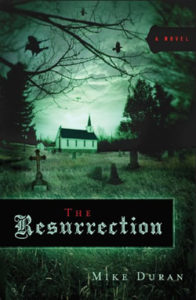Change The World But Don’t Change Its Author
Paranormal/suspense novelist Mike Duran is concerned concerned that some Christians want to ban zombies. Worse, Duran suggests, some Christians would wrongfully tie a chain of theology around the ankle of speculative stories before they can even make it out the gate.

Forcing fiction to neatly fit your theology is a losing proposition… at least, if creative storytelling is your aim.
[…]
I have long argued that one of the inherent problems with Christian speculative fiction is that Christian spec-fic, by its very nature, cannot be speculative enough. We impose overly strict theological expectations on our fiction.
Such as the paranormal novelist’s take on our Friday feature “How Then Can It Be Christian?” by James Somers.
On Friday the Fallen author cited The Shack‘s anti-Biblical conception of God’s nature.
God is viewed as being completely different in nature than we find him in the pages of scripture. He is viewed as not caring about a person’s sin, or being concerned with judgment–all of which are heretical views.
He goes on to say:
Likewise, we should never present a view of the world that contradicts God’s Word. Should we fill our pages with characters who believe that evolution is truth and there is no Creator God? […]
Rebecca LuElla Miller’s balanced interaction was on Monday. She noted:
[…] Spurred by Mike’s thinking, I have long argued against both of his conclusions (which he also stated in posts such as “Can Christian Theology And Speculative Fiction Coexist?”): 1) that a Biblical framework must by definition limit our imagination (and in this stance, I’m also disagreeing with James Somer’s position regarding what specifically falls into the category of misrepresenting the way the Bible shows our world), and 2) that Christians ought not “impose overtly strict theological expectations on our fiction.”
 Here’s an indirect sequel to focus on this central point:
Here’s an indirect sequel to focus on this central point:
In speculative stories, Christians must not confuse God’s nature with God’s real world.
I wonder if authors Somers and Duran may have both accidentally slipped on rolling apples and compared them to oranges:
- Showing the real world’s nature differently in a story is fine.
- Showing God’s nature differently in a story is wrong (and it makes for a poorer story).
In general I’m not bothered by Somers’ statement (“we should never present a view of the world that contradicts God’s Word”). Yes, someone may say, “Stories shouldn’t contradict the Bible,” and may truly mean that speculative stories must be banned or constricted because they change the nature of the world. But others simply mean, “Christian stories shouldn’t contradict the nature of God, including His holiness, love, omni-everything power, and plan of saving grace from evil.”
That’s the point of my comment here. And I do claim this is the Biblical view based on one very prime Example.
Eh, I’m not worried about this either way.
If someone says a story’s theology should not contradict God’s Word, I chalk that up to him/her striving to be faithful to our personal Savior. [Otherwise] any fiction could be said to “be contradictory to God’s Word” because God’s Word describes reality, which fiction isn’t, no matter how contemporary.
What I think such folks are actually trying to say is that a work of fiction, by a Christian, should not end up tweaking God’s Nature or salvation.
You can invent a world in which down is up or water is dry. But do not, as a Christian, invent a world in which if God exists (e.g. if the story touches on this) then He is evil, or else non-omnipotent, cruel, ignorant, etc.
Ergo: ghosts are allowed [as in Duran’s debut novel The Resurrection]. A cruel spiteful or stupid God is not.
Source: Jesus Christ Himself. He told stories in which God is often absent. Or if He is absent, He is seen acting in what is arguably Christ’s work of fiction — e.g. the boastful rich man of Luke 12. But four chapters later comes what is perhaps the great Storyteller’s most fanciful-sounding tale, of another rich man who dies, enters Sheoul, and is yet somehow able to converse with Abraham across the divide with the “good side” of the grave. Jesus here changes the “rules” of the real world. And yet God’s nature remains intact.
Someday I’ll work on this idea more, originally suggested in this 2012 column.
No matter how other a world is, the God of that world must always be the same.
You can make up a world called htra’E, or Narnia, or a parallel Earth in which children live before coming to Narnia, or Middle-earth, or even the parallel Earth of Harry Potter.
But if God will be at all involved in that world, He must be like the true God.
Otherwise, we horribly break His rules. Otherwise, we present another, and false, Jesus.










































You nailed it. With 6-foot cast iron spikes.
I disagree. Fiction is fiction. There is no limit for our imaginations.
If I choose, I can write about a world in which God does not exist. I can write about a world in which an evil deity created the cosmos and reigns as Supreme Villain.
There are no arbitrary boundaries.
The only limit is the one every Christian has on all their endeavors: to do all in accordance with one’s conscience and my understanding of the Word of God.
Note: my conscience and my understanding. In other words, “your mileage may vary”.
You may feel that you cannot glorify God outside the boundaries you outlined in this article, but quite frankly I find your boundaries short-sighted. I think I know the point you were trying to make but, as written, I disagree with your assertions. I can think of a number of situations in which telling a story about a universe where God is different or absent might be perfectly appropriate for a Christian.
Besides, we all change and grow over time. We should allow for that, too. I may write a book about a universe in which God is evil (thinking that it would make a useful contrast), and then decide not to write that way again after seeing that it has a negative effect on readers.
I don’t know about this. I don’t think those stories would necessarily be Christian stories. If God is absent, you are working from a deist framework. If evil, a Gnostic one of the demiurge. It will be hard to not have those spiritual frameworks overpower the message you intend to send.
Oh, come on, guys! I know you’re creative and imaginative. Why are you drawing these lines? Why create a box that doesn’t need to be there? Why do we even argue about what’s possible to write “as a Christian”?
You seriously think I “can’t” tell such a story as a Christian? That it wouldn’t be a Christian-friendly story, just because the deity in the story is evil?
You can tell such a story and have the reader walking away thinking, “I’m so thankful I live in the universe I do! The Christian God may not be my favorite, but he’s sure better than THAT…”
I just think the way Stephen put forward his central assertion for this article is bogus, is untrue. “We can imagine a land where down is up and water is dry, but not one where God isn’t God. Source: Jesus Christ.”
Um, yes, we can. We can imagine anything. Like Han Solo said, “I can imagine quite a bit…”
Maybe Stephen should have said, “Christian art and stories have the greatest witness to the world when we speculate on other universes and yet keep God’s nature true to the Scriptures.” Or whatever he REALLY meant by what he said. Because I don’t think he meant to say that we can’t physically imagine a universe where God isn’t God. Because we can. Duh.
We’re writers. So if we’re going to make an assertion, we’re accountable to our readers to say it right. Sometimes it takes a little discussion with others to really hone in on what we meant to say, so I’m not dissing Stephen for what he wrote. Just disagreeing with what it says. And suggesting that it’s silly to create rules about what can and can’t be written, when the Bible doesn’t specify such.
Rather, let’s couch this discussion in terms of what is a responsible use of our gifts, or what is most glorifying to God.
I did like that Stephen was analyzing the way Jesus told stories, and how God is not always a character listed in the cast. I think it’s very useful for Christian writers to ponder how Jesus used parables. But I also think that I’m not Jesus and that it’s possible that He could move me to tell stories in a different way than He did. He used a tremendous amount of variety in how He moved various prophets to share His Word. So I expect to see a wide variety of expressions in Christian ministry today, too.
I agree. It depends on the purpose of the story. If the purpose of the story was to make people actually think God is different than he is, that would be bad. But if the story showed God as different than he is, but actually drove people closer to the real God, that would be good. Of course, you’d have to be very careful (but then, as we’re always being told, nothing is ‘safe’)
I think this is your best point, Teddi, and I considered that while writing the above piece. In this case, though, you’re actually keeping God “in” the story, but hidden — almost not-there — but waiting behind the scenes, a silent import from the Real World, ready for the comparison you mentioned.
Kristin said it before I could:
Again my incarnated point of comparison is The Shack. Despite whatever good intentions, its author did not try to make up an alternate-universe false god even for the purpose of comparison. Instead — and I am afraid this comparison must be intentionally nasty — he threw some gold objects into a fire, melted them down, and cast a golden calf to erect before the people, crying, “Behold the Lord your god.” The result is not beautiful or truthful, not even subtle gratitude to the real-world God, and actually a dull story.
Now I’m glad I worded it that way: where God isn’t God. If you make up a world and, for the sake of contrast (even if subtle), put a devil in charge, or a Gnostic demiurge, or the atheists’ conception of “the OT god,” or what-have-you, and you’re not actually saying “[the real] God isn’t God.”
Again: Then imagine a new primary color. 🙂
I’m not trolling. Only showing that our imaginations are limited by the real world. We also can’t imagine a world with wholly other laws of physics (only reversals of the laws we know). Or wholly other kinds of life (we usually stick tentacles or teeth where they oughtn’t be and call it alien). Or a wholly other morality (we can only conceive of the real-world rules upheld or subverted).
No, of course we can. The author of The Shack did. Joel Osteen does all the time. In our worst moments of fighting the old man of sin, we do it all the time. (God isn’t really God. He doesn’t care about this little old sin …) So instead I’m saying, if we want to glorify God in stories, we don’t want to say “God isn’t God” by portraying Him wrongly, if He appears at all, in fiction.
(Readers. 🙂 SpecFaith is for readers first, writers, second.)
The discussion never ends and no one column can say everything. That’s why I’m grateful for comments — particularly those that offer a challenge!
Oh, He did, and we can easily say that in the OT prophets, for example, there are just as vivid and wide a range of storytelling examples that count just as much as Jesus’s parables as anyone. The parable idea did not begin with Jesus, after all. He inherited that communication gift from His Father.
See below comment about whether we should imitate Jesus/God exactly in storytelling. I’m not suggesting this is some kind of storytelling “regulative principle.” I’m suggesting that this is a good place to start the discussion.
I wonder, therefore, if there is actually any difference at all between how OK it is to make the world different and how OK it is to make God different.
In both cases, is it not the case that a story that makes people think reality (world or God) is actually different than it is would be a bad story?
I’m thinking of stories that, for example, give people a wrong view of history or science. I bet most people think William Wallace was a long haired blue faced kiltie 🙂 And I have heard of many graphic designers whose clients want them to ‘enhance’ or turn around photos like they do in CSI. The problem with these is they are purporting to be reality (not fantasy), and people’s idea of reality is skewed because of them.
Obviously nothing like as drastic as misapprehending God – but is it not just a difference of magnitude?
As a Christian its easy to write or imagine what you like. I’m not sure radically altering the nature of God can make for specifically Christian stories. It’s dangerous because some people will look at your evil god, and instead of looking at the Christian God as better, will be relieved they don’t believe in a god at all. Or if you alter it enough, some people might actually prefer your idea to the reality. Call it the Aslan paradox, I guess.
I think the nature of God is one of the few things we can’t transgress. Mostly because of the risks I mentioned above, but also because the point of the work that requires it could easily be done through other means.
This is impossible.
Try to imagine a new primary color.
That would be a closer to souped-up equivalent to Satan, then.
Doesn’t my point stand, though? You haven’t messed with God’s nature. As an imaginer you have quite safely distanced yourself from messing with Him. It’s the next-best step to simply “leaving Him out” of the story. I shan’t judge that. Jesus Himself told “secular” stories such as about shepherds seeking lost sheep or a widow hunting a lost coin, that don’t mention God.
I’m about to read your further considerate criticism, but so far I’m not seeing anything that overthrows this “boundary.” But it may help to posit specific examples. I say that The Shack is one example of “speculative” fiction that crosses the line specifically because it tries to offer a mutated version of the real-world God. Similarly, if I professed Christ but wrote a story in which a Christ-equivalent came into the world as the truly good Deity/Creature (this is key; I don’t mean a Christ-type) and failed, that would both be a God-dishonoring and boring story.
Better articulation of what the actual problem would be.
I have nothing to add
When I was a small child I somehow had the idea that it would be wrong to put a church in a fictional story, because that church didn’t actually exist!
By the way, I don’t mean that just because Jesus did this in His stories, we’re required to do the same in ours. Jesus never gave such storytelling instruction. However, I think it’s very cool that we can “cheat” the argument and go directly to the Source for great storytelling examples. Those who enjoy Christian songs don’t have it so blessed!